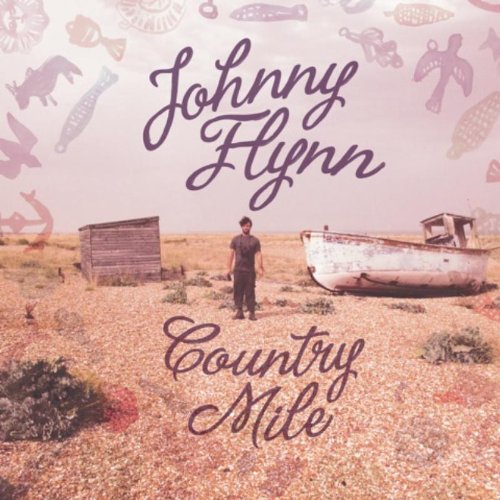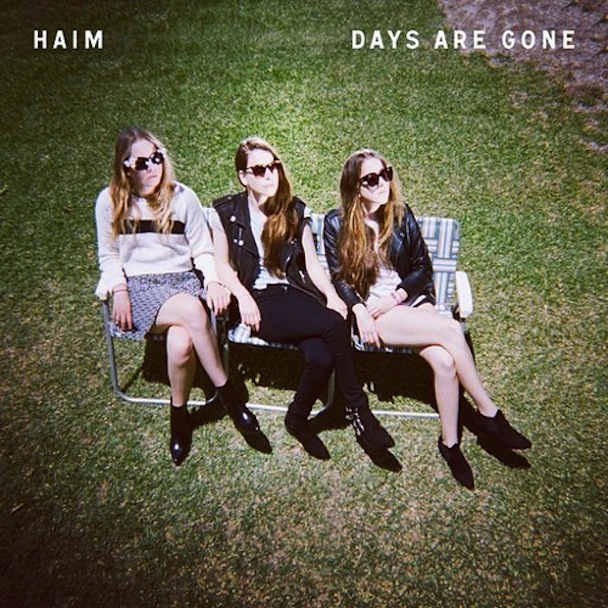Videos by American Songwriter
Aoife O’Donovan’s Fossils may technically be a debut, but long before it arrived, the Boston singer-songwriter built up a long and impressive resume that includes performing with progressive bluegrass group Crooked Still, collaborating with members of Nickel Creek and Punch Brothers, and touring with Garrison Keillor’s radio variety show, “A Prairie Home Companion.” So her first proper solo album is actually that of a seasoned and experienced performer — one whose haunting folk tunes are beautifully matched by her own mellifluous vocals. And in that sense, Fossils is ultimately a gallery of highlights, among them the gentle opening string plucks of “Lay My Burden Down,” the gritty country rock of “Beekeeper,” the barn-burning “Fire Engine,” and the hypnotic and layered arrangement of “Briar Rose.” I could go on, but here’s the gist — not a second of Fossils’ 40 minutes is wasted.
Carry On isn’t flashy or trendy, just sturdy-as-hell and impeccably crafted. The western-dub of “Restless Fugitive” manages to paint John Ford-style vistas with a simmering reggae pulse before segueing into “Shadows in the Dark” which bears an eerie — and welcome — melodic similarity to Eric Bachman’s haunting Archers of Loaf-era classic “White Trash Heroes.” What Willy Mason has is a clear, inarguable mastery of songcraft. Layers unfold with each repeat listen, with split-second note shifts sticking with you as you lay down to sleep long after you’ve stepped away from the stereo. From the buried tremolo-guitar of “It’s the End” to the woozy, lyrical percussion of “Walk Me Down,” Carry On is a work of subtle charms and intimate delights. Be it the extra-wet, over-delayed ghost of a beat buried deep underneath “What Is This” or the fact that Mason can make the most over-used reference point in American music — the pickup truck — seem vital and fresh on not one but two (!!!) songs, Carry On stuns from start to finish.

28. Josh Ritter: The Beast In Its Tracks
“All the stories I could tell, if I felt like it now,” Josh Ritter sings on his latest record. For his seventh album, Josh Ritter reeled in his literary tendencies–2010’s So Runs the World Away was full of sprawling magical realism and sparkly allusion– and instead recorded the plainly direct, intensely personal The Beast In Its Tracks. Ritter’s album is at turns despairing, cheerful, dark, and outright joyous, a rich addition to the ever-growing canon of divorce albums. The bleeding heart directness in his latest record is a new step for Ritter, and it serves him well. Beast weighs love new and old, letting past pain clash up against fresh joy, and the results are deeply moving.
“She only looks like you in a certain kind of light,” is the album’s premise of sorts, and Ritter finds a gorgeous, tense poignancy in a man’s momentary lapse into lost love. Much to its credit, The Beast In Its Tracks has a wicked sense of humor, tracing the all-too common cruelty that often follow a nasty breakup. “But if you’re sad and you are lonesome and you ain’t got nobody true/I’d be lying if I said, that didn’t make me happy too” Ritter sings with a big goofy grin on the payoff to “New Lover,” one of the many standout tracks on Beast. It’s a funny moment, but most of all, it’s honest.

27. Brandy Clark: Twelve Stories
Brandy Clark’s debut album has received a showering of critical accolades from country revivalists, championing the Washington songwriter’s gritty Nashville realism as a welcome return to the outlaw country of Waylon and Willie. But Twelve Stories employs its formal conservatism in order to address contemporary concerns. Her debut album is full of chemical addiction, but this time around the songs are littered with pain pills. The romantic exploits, whims, and regrets of women are Clark’s main subject matter, the reason they rely on their distractions—pills, joints, and lotto tickets—so heavily.
Clark knows where to look for drama and weight. “What keeps me out of heaven will take me there tonight,” Clark sings as she waits, trembling, for the hotel elevator to take her towards an extra-marital affair. It’s one of the many moments on Twelve Stories that proves Brandy Clark will be a fixture in Nashville for a very long time.
If you’ve done much reading about buzzy pop music this year, you’re probably aware that Lorde is, in fact, a white, teenaged, New Zealand singer-songwriter named Ella Yelich-O’Connor. She scored an out-of-nowhere alternative hit with “Royals,” but broadcasts her sense of detachment and doles out her brooding critiques in a manner no member of a royal bloodline could get away with. Her debut album, Pure Heroine, has made her a sort of poster child for smart, and smart-assed, anti-pop. There are those who’ve taken her eye rolling at luxury lifestyle role-play as a presumptuous attack on aspirational African-American music, namely hip-hop. But it’s much more likely that she’s talking to her hip-hop-digging, middle-class suburban peers—and herself—highlighting the profound disconnect between singing along with champagne-and-Cadillac fantasies and recognizing that that’s hardly the path that leads to personal substance. Lorde’s perceptive point-of-view, combined with the sleek, subterranean minimalism of her electro-pop tracks, makes for one of the year’s most potent one-two punches.
Days Are Gone was the one of the most hyped indie-pop albums of 2013, and the greatest feat of the Los Angeles Haim sisters’ debut was that their record lived up to anticipation. Days Are Gone is a collage of ‘7os classic rock and ’80s dance-pop, and the eleven song collection is jammed with carefully constructed hooks and delicately placed bass runs. But a good part of the joy of Days are the ragged imperfections that shine through the album’s glossy, bright production. This is the type beloved debut that comes with songs that have been worked on for years, and it’s clear Haim has a rare gift for pop songwriting, tossing off each of the half-dozen single-worthy tracks here with an infectious casualness. The trio’s wonderfully imperfectly harmonies lead the way on “The Wire” and “Days Are Gone,” while lead singer Danielle Haim’s hiccups and stutters on “Forever” and “Don’t Save Me” give the song’s frantic nostalgia an edge and grit otherwise absent in pop that sounds this good.

24. Johnny Flynn: Country Mile
UK singer-songwriter Johnny Flynn first registered on listeners’ radar with 2008’s A Larum, which found him dabbling not in British folk as a peer like Laura Marling would, but in a sound more dramatically influenced by Americana and country. And after a hiatus from music spent chasing the acting bug, Flynn’s return with Country Mile found him balancing the American country that informed his previous two albums with a bigger, festival-folk sound that erupts into some inspiring and altogether fun moments. Layers of organ and trumpet turn “The Lady is Risen” into a joyous romp, while “Country Mile” sounds like a classic English folk tune channeled through a distortion pedal. But Flynn’s songwriting is just as breathtaking when stripped back to its bare essentials, as on the slow-building “Einstein’s Idea.” Whether aiming for quieter moments or big, barroom sing-alongs, Country Mile is Flynn at his strongest.
Viral marketing, David Bowie, SNL, James Murphy, dress codes, interactive videos and a contentious review that brought the band’s sex life into question all contributed to why Arcade Fire’s fourth album Reflektor was one of the most talked-about albums of 2013, but not necessarily why it was one of the best. Well, James Murphy does — the former LCD Soundsystem frontman brought a much-welcome layer of disco sheen to the band’s earnest indie rock, which only amplified the intensity and gravity of their work. A complex conceptual double-album surrounding personal interaction and modern technology, intertwined with Greek mythology, Reflektor looks, on the outside, like a prog opus from the 1970s (and it’s nearly as long at 80-plus minutes). None of that would matter if the songs weren’t there, and the title track, the hard rocking “Normal Person” and the anthemic “Afterlife” are some of the best Arcade Fire has ever written. Albums this ambitious carry substantial risk, but in the case of Reflektor, it’s far outweighed by the reward.

22. Slaid Cleaves: Still Fighting The War
Billy Bragg may call himself “the Sherpa of Heartbreak,” but Slaid Cleaves is its cartographer. On this album, he maps a craggy landscape of loss, sorrow, regret and resignation that somehow sounds soothing, even though these cinematic vignettes don’t offer much hope for a happy tomorrow. You fight a war, you come home a mess. You work hard, but they take your job away. You fall in love, marry and procreate, then your mind fades as your loved ones watch. In “Rust Belt Fields,” he sings, “No one gets a bonus for bloody knuckles and scars/No one remembers your name/Just for working hard.” With a high, rust-edged tenor that eats away any protection his characters might wear, he exposes their souls along with their lives. Yet he also finds room for upbeat brevity with a pair of charmers, “Whim of Iron” (perhaps about his mother?) and the clever “Texas Love Song.” And he celebrates his beloved mentor, Don Walser, in “God’s Own Yodeler.” In the end, though, Cleaves returns to departures, considering his own in “Voice of Midnight.” But he leaves us with a pragmatic thought, singing, “The only vow I make/to live true and die well.” That’s one aspiration we should all share.

21.Valerie June: Pushin’ Against A Stone
You may know Valerie June as the siren in red who accompanied Eric Church at the most recent ACM Awards. Or you might’ve heard her conjuring Nina Simone on Meshell Ndegeocello’s album last year, or pulling her weight in a roots revivalist string band alongside Luther Dickinson, Amy LaVere, Shannon McNally and Sharde Thomas before that, or serving as the subject of a mini-doc made by the director of Hustle & Flow even earlier. Her fourth album, Pushin’ Against A Stone shows off her own tradition-tweaking vision (she calls it “organic moonshine roots music”) and her arresting voice, veering from girl group to gospel to bluegrass to folk with ease. The album was co-produced by The Black Keys’ Dan Auerbach, who duets on a great acoustic cover of Estil C. Ball’s “Trials, Troubles, Tribulations.” Booker T. Jones stops by to lay down bluesy organ on June’s “Somebody To Love.” If you haven’t checked this album out yet, you’re missing out.


















Leave a Reply
Only members can comment. Become a member. Already a member? Log in.